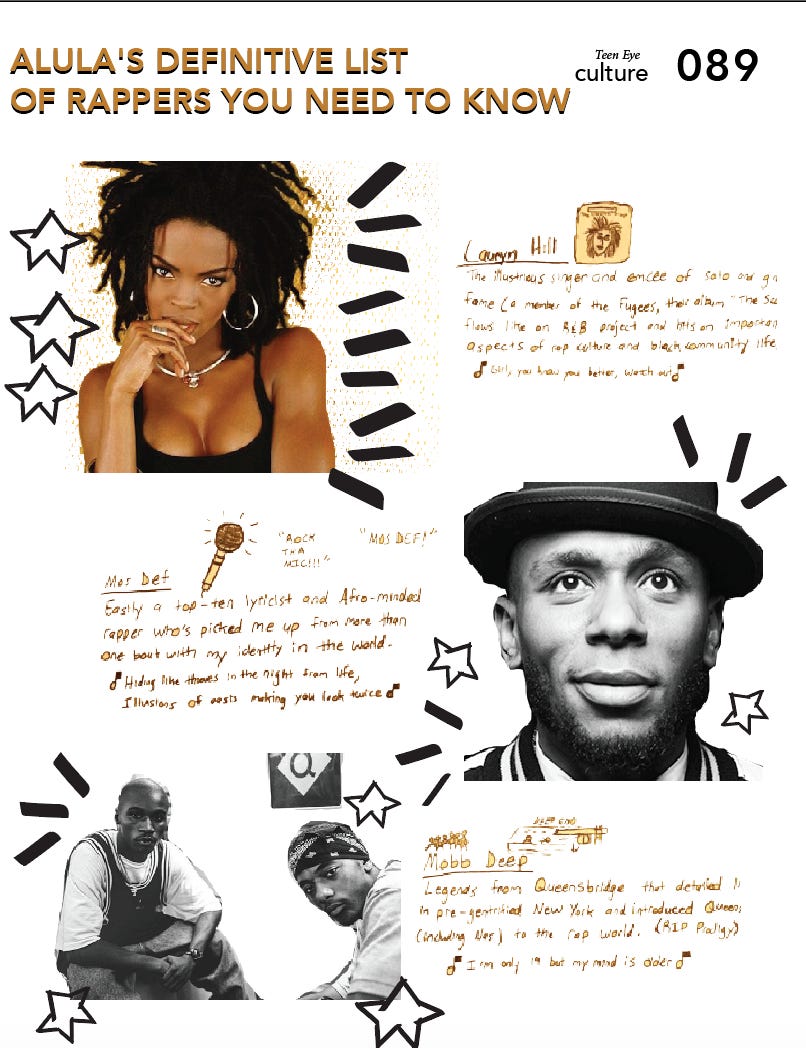Flows Consciously Cascading into Liquid Swords
For Hip Hop's 50th anniversary, I wanted to re-publish my first-ever essay; I've been writing about rap since I was 17. Big gratitude to the publication that first platformed me, Teen Eye Magazine.
(please bear with me here; this essay was written in 2017, when I was an asshole of an adolescent with some points to prove; it is kind of interesting, at least to me, to see myself circle around some of the same topics 6 years later. I’ve edited the piece here, but mostly left it alone to stand).
(sketches and captioning done by myself, photos sourced by Teen Eye)
As one of the most armchair-bound social critics, my analyses of commercialism and superficiality manifest in an annoying and questioning exterior, presented mostly as sheer precociousness on my part--essentially, I’m a smart ass and that aggravates people (rightly so). However, this critical outlook has developed into a search for similarly inquisitive figures--people to identify with throughout cultures in philosophy, politics, the arts, that questioned the goings-on of their day, from Karl Marx to Marvin Gaye and many in between.
I’ve been an avid rap fan almost my entire life--my dad would never admit to it, but he introduced me to the “vulgar” wares of Tupac and Biggie when I was 8 years old via his old Microsoft Zune mp3 player--and I always viewed this interest as parallel to but in no way related to attempts to philosophize.
Stumbling across Mos Def in an admittedly bumbling effort to expand my understanding of context New-York-hip-hop-culture-wise, I listened to his 1999 debut album: Black on Both Sides, from the intro track entitled “Fear Not of Man” through to the jazz-soul finale in “May-December” with detours into Brooklyn and battle rap culture. This was my first real exposure to “backpack”-rap on a legitimate, introspective level, and the first artist I’d listened to that was adamantly vocal on a myriad listing of social mires. After linking this to an existing connection to Common, poet-turned-rapper-turned-poet-again from Chicago, this consciousness and lyricism evoked in me an ability to understand stories and lives both familiar and unfamiliar to my own sheltered life. I re-listened to To Pimp a Butterfly, and 2014 Forest Hills Drive, while discovering anew wordsmiths like Talib Kweli, Isaiah Rashad, Lauryn Hill. This consumption led me to tunnels into underground hip hop and pioneers like Murs, Little Brother, and Clear Soul Forces, all of whom frame answers to my questions and the world’s threatening offerings in an ingestible way.
Through hip-hop, I was better able to understand Afro-centricity, mass incarceration, reparations, even materialism and power dynamics (listen: “Just Begun” by Talib Kweli and Hi-Tek, noteworthy guest appearance by Yasiin Bey; “I Gave You Power” by Nas). This culture and this lyricism also engendered my interest in slam poetry, and it has fueled numerous small, failed ideas and projects that have nonetheless inspired me and provided the armor I use to get by.
This armor works many duties; a spiritually-engaging protective force, I’d cloak myself in the knowledge and wisdom expounded by the mathematics-providing, tricknology-exposing members of the Nations of Gods and Earths, the Ansaru Allahs, and the Nation of Islam; from Jeru the Damaja to Jay Elec, Wise Intelligent to Knowledge Reigns Supreme Over Nearly Everything (KRS ONE), Ghostface to King Geedorah, our peoples oozed godliness and righteousness, cursing whiteness as a construction and unearthing Black agency from within. Factually deconstructing white supremacy, I took solace in the statistical understanding of our condition as proposed by Mos on ‘Mathematics’; a rejoinder to racialization, I found heart, devotion, and reclamation of our beauty in records like ‘Afro Blue’ (Erykah Badu and Robert Glasper), ‘Love’ (the Globetroddas), and ‘Brown-Skinned Lady’ (Black Star). From Common’s references across his discography to Black Power to Phonte Coleman’s encougaging recession-reckoning on “The Good Fight”, and tracks from parochial giants like the Bay Area’s Paris (‘The Days of Old’), enlivening politics bleed through our music, pushing our power.
Listening to hip-hop has become both an exposing and an insulating activity, as I use rap to connect with the world around me from within the cocoon of ‘conscious’ music to experience and interact with nuance. Don’t get me wrong: as a medium, there is much work to do in expanding this faction of hip hop, and in introducing anti-colonial constructions of sexuality and gender as themes of misogyny (to say nothing of the at-times-eclipsing misanthropy) and homophobia recur throughout much of the genre. However, I gain some glimmer of hope whenever I listen to ‘The World is Yours’, entreating the will to power to the next generation to do what they wish. The music buoys me over the turbulent and murky waters of life with commentary and relatable wit, thus providing me with the shielding necessary to plug through my day-to-day.



